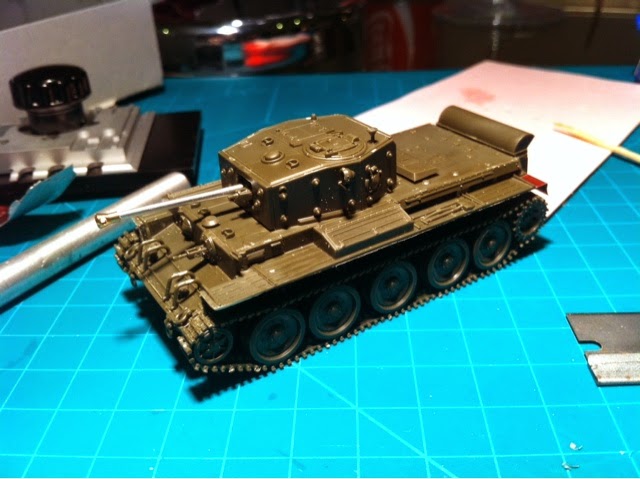For a long long time, I've been fascinated by the anti aircraft armour fitted to the panther tanks of Panzer Regiment 26 in Italy 1944 and wanted one of my own for my tank collection.
Here is they looked like in Panzerwrecks (destroyed German tank porn)
To build an example, I purchased the early Panther kit by Dragon ...
and the the ET Model upgrade kit plus some plastic rod.
And that was as far as it got for a while. Eventually I pulled out the kit and assembled it. Was a bit disappointed by the quality of the Dragon kit compared to Revell as some of the parts needed a lot of cleanup and the plastic didn't feel like a real quality product. Then came the fiddly bit - assembling the ET Model upgrade kit and putting it on the Panther. Really f@&king awkward but got there in the end although I didn't bother with the butterfly wing nuts the size of a full stop. I have no idea how any one fits that stuff. Also added some ammo boxes to the engine deck to give the impression that it was being reloaded. Also made the tow cables extra long and hanging downs with one attached to the front shackle as had seen that one someone else's panther and thought it was more interesting. Should have paid more attention to measurement as the cables are really too long and one is longer than the other. I did however scratch billy old brackets for them at the back using spare photo etch. Anyway. That's the build.
I primed the tank with Vallejo Grey and Black primer with the idea that I would spray so lightly that the shadows would come through. Fail. But here's some pictures of the attempt!
Innovation wise however, I have taken to super gluing the turret and body into the ends of sringes formerly used to administer medication to the cat. Or the top of a bottle opener. Much easier.
Painting wise, I painted the bottom half of the chassis in XF-60 Dark Yellow and then sprayed the rest with a Dark Yellow mix lightened with XF-2 White probably in a ratio of 50:50. I probably should have done the wheels with the same mix as that looked a bit weird later on. Glad I did lighten the mix however as applying washes darkens the model considerably - especially with the zimmerit.
Next thing was adding some green camouflage as per the picture on the box. I ended up doing this free hand for the first time with the airbrush using XF-61 Dark Green. Had a few issues but nothing major. Might think about dropping the pressure some next time to around 12-15. The XF-61 Dark Green ended up being a bit too dark so over sprayed it lightly with my Dark Yellow / White mix to tone it down some.
Oh ... I should add that I thought I'd try out the hairspray technique on the anti aircraft armour so painted that with Vallejo's Rust & Chipping Effects paint set and chipping fluid before painting the tank overall. Then had a play at chipping and probably over did it. Still, it does make the model look more interesting.
While I had the rust effects set out, I decide to paint the spare tracks using various shades. And while I was at it, painted all the other details with various Vallejo paints. Wheels and tracks were painted using the AK Tracks & Wheels set. Great set. Will get a lot of use.
Next step was a X-22 Gloss varnish finish in preparation for the decals. Tried Decal Fix again as I was struggling to get the numbers to fit over the zimmerit. While it is a bit 'hot' chemically, I let it dry overnight and it worked great! Painted over the decals with more X-22 Gloss Varnish then moved onto washes.
Washes have never worked well up to now so I thought I'd try something a bit new and made my own wash from burnt umber oil paint and leave more wash around the details. Also tried another go at pin washes for some of the panel lines. Once it dried, I was really happy with the results - especially around the wheel nuts and the panel lines. Then XF-86 Flat Clear varnish for the next stages of weathering.
Next stage weathering was some light mud using various AK potions and plaster powder including first Kursk Earth and then Dust Effects. Sprayed Dust Effects over the whole model and also put some dots here and there around details. Ended up over doing it but the great think about using these enamel/oil based paints is you can remove and rework things. Other products used were MIG Dark Wash on the tracks and amp boxes, AK's Fuel and Engine oil stains potions on the engine deck and around the wheels plus a graphite pencil along the edges of things for definition plus to add a few scratches. For contact part of tracks, I dry rushed on Vallejo Oily Steel which came in one of the Panzer Aces paint sets I bought yonks ago.
Decided not to play with pigments this time around as no idea really what to do with them.
So here is the result, photographed using freshly painted blue paper as a background (makes the colours come out better).
Is it finished? Not quite. I am experimenting with some mesh to use as chicken wire that the tank crew used to attach foliage to use as camouflage. It might be a little to hard with this scale so I might just use foliage by itself. Stay tuned.





















































